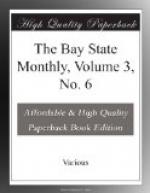* * * * *
The pathos and humor which have immortalized many of WILL CARLETON’S earlier poems enter again into his City Ballads.[11] If ever a poet comprehended the human heart and the mainspring of its responses, it is he who gave us that wonderfully-common-place (by reason only of its theme) but delightful versification, “Betsey and I are out.” His new collection embraces several pieces almost as striking in their character; and their wholesomeness and truthfulness of sentiment will win for them many readers. None of these poems are fanciful pictures of life which does not exist; but they are, on the contrary, faithful to the actualities of the living present. They portray metropolitan life as in a mirror, and depict the mishaps of the inexperienced therein in a way that is at once healthful and conducive to practical morality. Every poem is a story, which carries within itself a lesson not easily forgotten, and as a poem is almost invariably characterized by a pleasant rhythm and animation. The illustrations—and they are numerous—are excellent; indeed, one would not wish them to be better. These poems and pictures will find entrance into many homes ere the holiday season is ended.
* * * * *
One of the most astonishing successes, in a literary line, of recent years is Col. Higginson’s “Young Folks’ History of the United States.” Published originally as a book for general readers, its superlative merits commended themselves to teachers, then led to the introduction of the work, as a text-book of history, into very many schools. No other work of the kind, we believe, has met with such signal favor or so richly deserves it. So far as it goes, it is by all odds the ne plus ultra for school use.
The same author has recently published what he terms A Larger History of the United States,[12] which, however, ends only with the close of President Jackson’s administration. So far we fail to discover any raison d’etre of the volume, unless its purpose is distinctly to bring together in a re-arranged form the series of illustrated papers on American history contributed by Mr. Higginson to Harper’s Magazine during the past two years. If such is the author’s purpose, then we have no fault to find with the work. But the term “Larger History” is, in this case, a misnomer. The book does not contain as much matter as the earlier work to which we have alluded, and it is not, so far as we can make out, written for older readers. It does not strike one as being a history at all,—that is, a straightforward, logical, and continuous narrative coinciding with those exemplar types of historical writing bequeathed to us by Macaulay or by Motley. The book ends, as we have said, with the close of Jackson’s administration; but we glean very little concerning the administration and we are told much relative to “Old Hickory.”




